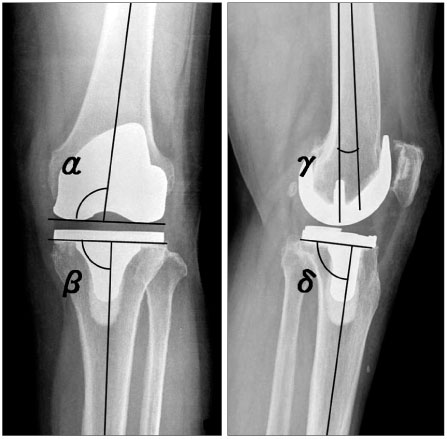J Korean Orthop Assoc.
2007 Feb;42(1):71-76. 10.4055/jkoa.2007.42.1.71.
Cruciate Retaining Medial Pivot Knee
- Affiliations
-
- 1Department of Orthopaedic Surgery, College of Medicine, Kyung Hee University, Seoul, Korea. bdkyung@khmc.or.kr
- 2Department of Orthopaedic Surgery, Bucheon Sejong Hosiptal, Bucheon, Korea.
- KMID: 2106378
- DOI: http://doi.org/10.4055/jkoa.2007.42.1.71
Abstract
-
Purpose: To analyze the clinical and radiographic results of patients who underwent total knee arthroplasty with a posterior cruciate retaining medial pivot knee, and to identify the technical aspects in preserving the posterior cruciate ligament.
Materials and Methods
From March 2002 to Dec 2003, 40 total knee arthroplasties with a cruciate retaining medial pivot knee were implanted in 28 cases. The average follow-up period was 2.8 years (range, 2 to 3.7 years). The clinical and radiographic results were evaluated using the clinical and roentgenographic evaluation and scoring system of the American Knee Society.
Results
The average flexion contracture before surgery was 5.4degrees, which improved to 0.6degrees at the last follow-up. The average preoperative knee flexion was 126.1degrees and 126.6degrees at the last follow-up. The average knee score improved from 60 points preoperatively to 94.8 points postoperatively, and the average functional score improved from 55.3 points to 87.0 points at the final evaluation. The average post operative alpha, beta, gamma and delta angles were 95.1degrees, 91.1degrees, 3.6degrees and 84.0degrees, respectively. There were no postoperative complications.
Conclusion
The short term clinical results in patients who had undergone total knee arthroplasty with a cruciate retaining medial pivot knee was acceptable.
MeSH Terms
Figure
Reference
-
1. Anderson MJ. Survivorship and range of motion of the Advance Medial Pivot Knee. Arlington TN 38002: International publication Wright Medical Technology.2. Blaha JD, Mancinelli CA, Simons WH, Kish VL, Thyagarajan G. Kinematics of the human knee using an open chain cadaver model. Clin Orthop Relat Res. 2003. 410:25–34.
Article3. Blaha JD. A medial pivot geometry. Orthopedics. 2002. 25:963–964.
Article4. Dennis DA, Komistek RD, Mahfouz MR, Haas BD, Stiehl JB. Multicenter determination of in vivo kinematics after total knee arthroplasty. Clin Orthop Relat Res. 2003. 416:37–57.5. Dennis DA, Komistek RD, Hoff WA, Gabriel SM. In vivo knee kinematics derived using an inverse perspective technique. Clin Orthop Relat Res. 1996. 331:107–117.
Article6. Ewald FC. The Knee Society total knee arthroplasty roentgenographic evaluation and scoring system. Clin Orthop Relat Res. 1989. 248:9–12.
Article7. Gioe TJ, Killeen KK, Grimm K, Mehle S, Scheltema K. Why are total knee replacements revised?: analysis of early revision in a community knee implant registry. Clin Orthop Relat Res. 2004. 428:100–106.8. Gunston FH. Polycentric knee arthroplasty. Prosthetic simulation of normal knee movement. J Bone Joint Surg Br. 1971. 53:272–277.9. Hill PF, Vedi V, Williams A, Iwaki H, pinskerova V, Freeman MA. Tibiofemoral movement 2: the loaded and unloaded living knee studied by MRI. J Bone Joint Surg Br. 2000. 82:1196–1198.
Article10. Hirsch HS, Lotke PA, Morrison LD. The posterior cruciate ligament in total knee surgery. Save, sacrifice, or substitute? Clin Orthop Relat Res. 1994. 309:64–68.11. Hollister AM, Jatana S, Singh AK, Sullivan WW, Lupichuk AG. The axes of rotation of the knee. Clin orthop Relat Res. 1993. 290:259–268.
Article12. Hozack WJ, Rothman RH, Booth RE Jr, Balderston RA. The patella clunk syndrome. A complication of posterior stabilized total knee arthroplasty. Clin Orthop Relat Res. 1989. 241:203–208.13. Insall JN, Dorr LD, Scott RD, Scott WN. Rationale of the Knee Society clinical rating system. Clin Orthop Relat Res. 1989. 248:13–14.
Article14. Iwaki H, Pinskerova V, Freeman MA. Tibiofemoral movement 1: the shapes and relative movements of the femur and tibia in the unloaded cadaver knee. J Bone Joint Surg Br. 2000. 82:1189–1195.
Article15. Kurosawa H, Walker PS, Abe S, Gary A, Hunter T. Geometry and motion of the knee for implant and orthotic design. J Biomech. 1985. 18:487–499.
Article16. Kuster MS, Stachowiak GW. Factors affecting polyethylene wear in total knee arthroplasty. Orthopedics. 2002. 25:Suppl 2. S235–S242.
Article17. Ledger M, Shakespeare D, Scaddan M. Accuracy of patellar resection in total knee replacement. A study using the medial pivot knee. Knee. 2005. 12:13–19.18. Martin SD, McManus JL, Scott RD, Thornhill TS. Press-fit condylar total knee arthroplasty. 5- to 9-year follow-up evaluation. J Arthroplasty. 1997. 12:603–614.19. Minoda Y, Kobayashi A, Iwaki H, et al. Polyethylene wear particles in synovial fluid after total knee arthroplasty. Clin Orthop Relat Res. 2003. 410:165–172.
Article20. Mont MA, Booth RE Jr, Laskin RS, et al. The spectrum of prosthesis design for primary total knee arthroplasty. Instr Course Lect. 2003. 52:397–407.21. Pritchett JW. Patient preferences in knee prostheses. J Bone Joint Surg Br. 2004. 86:979–982.
Article22. Schmidt R, Komistek RD, Blaha JD, Penenberg BL, Maloney WJ. Fluoroscopic analyses of cruciate-retaining and medial pivot knee implants. Clin Orthop Relat Res. 2003. 410:139–147.
Article23. Shakespeare D, Kinzel V, Ledger M. Achieving ligament stability and correct rotational alignment of the femur in knee arthroplasty: a study using the Medial Pivot knee. Knee. 2005. 12:419–423.24. Shakespeare D, Michael L, Kinzel V. Flexion after total knee replacement. A comparision between the Medial Pivot knee and a posterior stabilized implant. Knee. 2006. 07. 05.25. Stiehl JB, Komistek RD, Cloutier JM, Dennis DA. The cruciate ligaments in total knee arthroplasty: a kinematic analysis of 2 total knee arthroplasties. J Arthroplasty. 2000. 15:545–550.26. Stiehl JB, Komistek RD, Dennis DA, Paxson RD, Hoff WA. Fluoroscopic analysis of kinematics after posterior-cruciate-retaining knee arthroplasty. J Bone Joint Surg Br. 1995. 77:884–889.
Article
- Full Text Links
- Actions
-
Cited
- CITED
-
- Close
- Share
- Similar articles
-
- Anatomical Study Designed to Clarify the Mechanism of the Pivot Shift
- Total Knee Arthroplasty with PCL Substituting Medial Pivot Knee: Short-term Follow-up Results
- Total Knee Arthroplasty Using a Posterior Cruciate Ligament Sacrificing Medial Pivot Knee: Minimum 5-year Follow-up Results
- Pitalls in Interpretation of Physical Tests of Knee Ligament Injury
- Reconstruction of the Posterior Cruciate Ligament Using the Medial Meniscus



